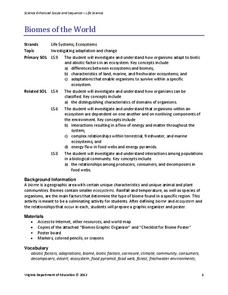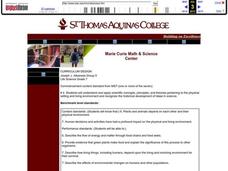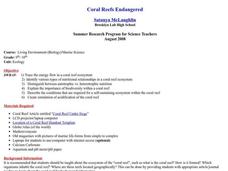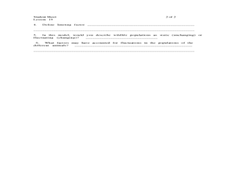Virginia Department of Education
Biomes of the World
Incorporate knowledge about biomes and ecosystems in multiple ways while encouraging creativity. Emerging ecologists collaborate and perform research to complete a graphic organizer about various biomes of the world. They conclude the...
Curated OER
Activity 1: Please Pass the Energy, Food Webs in the Upper Ocean and Hydrothermal Vent Communities
Students create food webs for two different ocean communities. They are given cards showing organisms from the surface of the ocean. They arrange them in order of who eats whom. After this class activity, students create a food web for...
Curated OER
Exploring Ecosystems
Fourth graders investigate ecosystems. In this ecosystem lesson, 4th graders explore producers, consumers, and decomposers and study the interdependence of each.
Curated OER
Circle of Life
Here is a well-designed science lesson that shows learners that everything that organisms do in ecosystems, including running, breathing, burrowing, growing, requires energy. After a thorough discussion of their own eating and drinking...
Consortium for Ocean Science Exploration and Engagement (COSEE)
Arctic Smorgasbord
Though the walrus spends roughly one third of its time on land, it eats organisms that live on the bottom of the ocean. The first in a series of five, the lesson uses a variety of plant and animal cards to have scholars build an arctic...
Curated OER
The Mighty Hudson Stretches its Mussels
Students brainstorm possible causes of zebra mussel migration and population expansion. They identify the key causes and effects of the disturbance of the Hudson River ecosystem and research causes and effects in the disturbances of...
Science Matters
That’s An Otter Story
Young scientists discover how sea otters' habitats have changed due to human impact. Through conversation, video observation, and story reading, scholars identify how human interactions change a specific ecosystem in both positive and...
Curated OER
Plants and Animals
Seventh graders discover the interconnectedness of plants and animals in ecosystems. In groups, they create a food web and discuss the problems when one link of the chain is broken. To end the lesson, they set up a balanced environment...
Curated OER
Marine Ecosystems
Students identify producers and consumers and construct a food chain from four marine ecosystems. They describe the delicate balance among organisms in each environment. In groups, students discuss the human activities that upset the...
Alliance Theater
The Jungle Book Post-Show STEAM Lesson
An ecosystem is really just the flow of energy through many different living organisms. A study of Rudyard Kipling's The Jungle Book leads to an environmental science activity in which learners study how various factors can affect...
NOAA
Understanding Food Chains and Food Webs
Jump into an exploration of marine ecosystems with the first lesson in this four-part series. After first learning about crustaceans, mollusks, and other forms of sea life, young marine biologists view a PowerPoint presentation that...
Curated OER
Food Webs
Sixth graders discuss and describe consumers and producers. They discuss and describe predator-prey relationship. Students review food chains. They form a circle, and each student is given an ecosystem card. Student at the top is given...
Curated OER
Urban Ecosystems 4: Metabolism of Urban Ecosystems
Cities are compared to living, breathing, metabolizing organisms. Fourth in a five-part series of lessons, this one focuses on the flow of materials through a city. Links to interesting websites and images make your delivery of...
Curated OER
Food webs and Energy Flows
Students become familiar with food chains. In this food chains lesson, students understand that as consumers eat other consumers energy is passed. Students understand the vocabulary associated with food chains.
Curated OER
How do plant & animal cells make and use energy?
Students show the relationship between the need for plants to undergo photosynthesis in order to generate oxygen. They see the flaws associated with this thinking because of the lack of CO2 and H2O and lack of sufficient gravity in order...
Curated OER
What A Tangled Web We Weave
Learners of many ages discuss how all organisms rely on other organisms for their survival. They construct a food web and energy pyramids, and write an informative essay about the food web that they have designed.
KOG Ranger Program
The Value of Oregon’s Forests
No matter where you go, you're in the middle of a forest in some way. Use a lesson about forests and the many ways they contribute to our world, including the ecosystems of animals and plants living in their shady soil.
Curated OER
Links in a Food Chain
Little ones make costumes and act out a rhyme in which there are daisies, bugs, wrens, snakes, and foxes that all interact in a food web. This would be a memorable activity for primary life scientists to participate in as a wrap-up to a...
Curated OER
Coral Reefs Endangered
Students identify different types of nutritional relationships in a coral reef system and trace the energy flow. In this marine biology instructional activity students create a simulation of acidification of the coral reef.
Curated OER
The Consequences of Extinction
Learners participate in a class discussion on site of an older style bridge to help connect the significance of each organism in an ecosystem by using an analogy of bolts slowly being removed from a working bridge.
Curated OER
Food Chains & Food Webs
Tenth graders examine how energy is lost through different trophic levels. In this trophism lesson students construct a food web and view a video.
Curated OER
The Many, Varied, and Unusual Places and Things on Earth
Students discover how energy flows through communities because of the relationship between producers, consumers and decomposers. Examining various ecosystems, they identify the materials that cycle continuously through them. They label...
Curated OER
Understanding Interactions Among Local Species and the Local Environment
Students examine the differences between biotic and abiotic factors, explain the difference between habitat and niche and compare how organisms get their nutritional needs. In this local environment instructional activity students trace...
Curated OER
Oh Panther
Students play a game that replicates the balance of prey and predators in an ecosystem. In this physical education lesson, students follow the instructions to play "Oh Panther!" Students collect data regarding the game and discuss the...

























